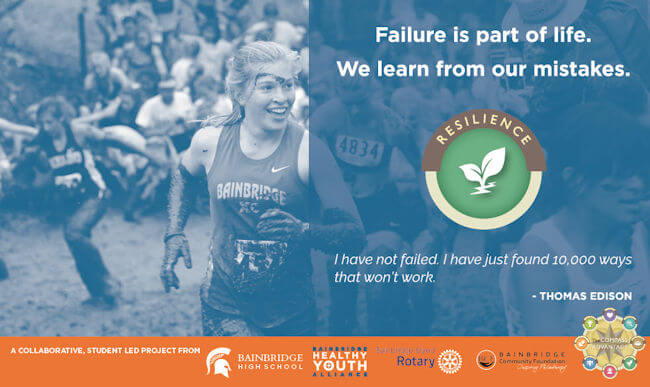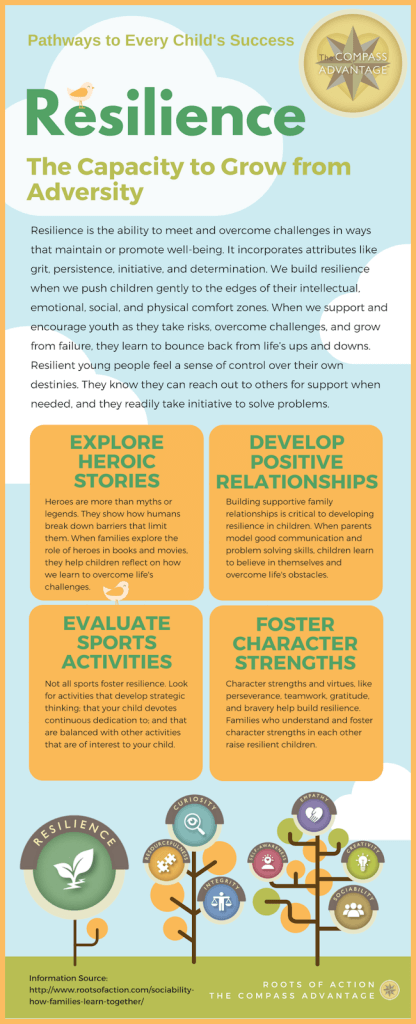
Most of us want to protect our children from struggle.
After all, if we shoulder their burdens, they’ll be happier, right?
Not usually.
Children are happiest when parents scaffold their children’s ability to tackle life’s challenging experiences.
This kind of scaffolding is necessary from a very young age. As children grow to become adolescents, parents who have cultivated resilience will witness teens who can bounce back from failure, manage stress, cope with loss, and adapt to change.
Resilience is not a genetic trait. It is derived from the ways children learn to think and act when they are faced with obstacles, large and small. The road to resilience comes first and foremost from children’s supportive relationships with parents, teachers, and other caring adults. These relationships become sources of strength when children work through stressful situations and painful emotions.
When young people cultivate an approach to life that views overcoming obstacles as a critical part of success, they become resilient. Families play a critical role in instilling this value.
Why Resilience Is Important to Your Child’s Success
Research shows that resilience is essential for human thriving, and an ability necessary for the development of healthy, adaptable young adults. It’s what enables children to emerge from challenging experiences with a positive sense of themselves and their futures. We recognize resilience in children when we observe their determination, grit, and perseverance to tackle problems and cope with the emotional challenges of school and life.
The ability to meet and overcome challenges in ways that maintain or promote well-being plays an essential role in how children learn to achieve academic and personal goals. Resilient young people feel a sense of control over their own destinies. They know they can reach out to others for support when needed, and they readily take initiative to solve problems. Parents facilitate resilience by helping children think about and consider various paths through adversity. They also help by being supportive resources, encouraging children to make their own decisions, and modeling resilience themselves.
Below are ways you can start today to cultivate your child’s ability to bounce back from life challenges!
Students from Bainbridge High School in Washington State chose the photo, words, and quote for the above RESILIENCE banner — one of seven that hang in the hallways of their school to remind all students of the core abilities that matter most to their development and well-being.
10 Ways Families Cultivate Resilience
1. Explore heroic stories.
Too often, children and adults view heroes as myths or legends rather than the representation of mere humans who succeeded in breaking barriers that previously limited them. By exploring and discussing the role of heroes in books and movies, families help children reflect on how we learn to overcome life’s obstacles.
2. Learn from mistakes.
Children are often pressured to be perfect. Yet research shows that learning is increased when children make mistakes! Kids experience failures or disappointments daily—with homework, friendships, sports, etc. Families build resilience in children when they see these experiences as opportunities for growth and learning. Discover ten ways to help kids learn from mistakes.
3. Develop positive relationships.
The American Psychological Association lists 10 ways to build resilience, with good relationships at the top. When parents model positive relational skills and help kids believe in themselves, children develop resilience and other core abilities. Learn more about positive parenting skills.
4. Learn to say “no.”
While we like saying “yes” to our children, resilience is developed when kids learn to accept disappointment and respond appropriately to discipline. Psychologist Dr. Vanessa Lapointe offers a simple sentence-builder strategy that parents can use to help deliver a nurturing “no.”
5. Engage in tough conversations.
When grief and tragedy strike, Dr. Harold Koplewicz, president of the Child Mind Institute, offers effective advice on how to help children express feelings, provide comfort, and engage in dialogue that enables kids to feel safer. Learn how to help kids make sense of terrorism and other human tragedies while promoting resilience and well-being.
6. Evaluate sports activities.
Many families think that sports help children develop resilience. But not all sport experiences do this. Research shows three important aspects of youth sports that are most helpful to development: intensity, continuity, and balance. Learn how to recognize and evaluate the power and limitations of sports and how they can build resilience and other positive strengths in your child.
7. Foster your child’s character strengths.
A set of research-based character strengths and virtues play a big role in determining our ability to face life’s challenges and obstacles. One of the best ways for parents to better understand character strengths is by first examining their own. Learn why character matters, how you can understand your strengths, and take steps to foster character in your children.
8. Set realistic expectations.
Many children feel angered when their grades or goals are not achieved. Often, this happens when kids have unrealistic expectations about success. They learn to feel entitled to certain grades or recognition, regardless of effort, when there are no penalties for breaking rules or when parents do their work. Learn seven principles that help reduce entitlement in children and boost resilience.
9. Teach perseverance.
Children learn the value of perseverance and hard work by participating in community activities and service programs. Look for six program characteristics that pay big dividends for kids, including those with a results-driven mission, skill-building, and teamwork.
10. Attend to emotional health.
Emotional health contributes to a child’s capacity to manage and cope with life stressors—to feel resilient. Counselor and author Raychelle Cassada Lohmann outlines five principles that help improve a child’s emotional health. When parents offer encouragement, face difficult times together, help kids believe in themselves, practice forgiveness, and enjoy today, they boost their child’s emotional health and improve kids’ ability to weather all kinds of challenging situations.
Resilience Infographic
The following infographic was created from the material in this article. Please feel free to copy, print, and share it with others!
Learn More About Resilience
Check out the following books to learn more about resilience and why it’s so important to your child’s success and well-being:
Grit: The Power of Passion and Perseverance, by Angela Duckworth
The Blessing of a Skinned Knee: Using Jewish Teachings to Raise Self-Reliant Children, by Wendy Mogel, PhD
The Blessing of a B Minus: Using Jewish Teachings to Raise Resilient Teenagers, by Wendy Mogel, PhD.
Resilience: Hard-Won Wisdom for Living a Better Life, by Eric Greitens
Building Resilience in Children and Teens: Giving Kids Roots and Wings, by Kenneth R. Ginsburg, M.D.
Articles in this Parenting Series
Successful Kids Need 8 Core Abilities: How to Parent With Purpose
Curiosity: How Parents Foster Lifelong Learning in Children
Sociability: How Families Learn Together with Love and Respect
Resilience: How Families Grow from Adversity (Currently Reading)
Self-Awareness: How Parents Foster Meaning and Purpose in Kids
Integrity: How Families Teach and Live their Values
Resourcefulness: How Parents Help Children Achieve Goals
Creativity: How Parents Nurture the Evolution of Children’s Ideas
Empathy: How Families Lead with Gratitude and Kindness
Free Resources for Parents
My Parenting Promise: a frame-ready document that helps reinforce the compass abilities through parenting practices.
I Have a Dream: a frame-ready document created by youth — to discuss with your children.
Reframing Success: Helping Children & Teens Grow from the Inside Out: an eBook that introduces The Compass Advantage. This eBook has been widely used by schools as a “Book Club” reading to engage parents about raising healthy children and teens.
Photo Credits: Bainbridge Healthy Youth Alliance
Published: December 5, 2016





